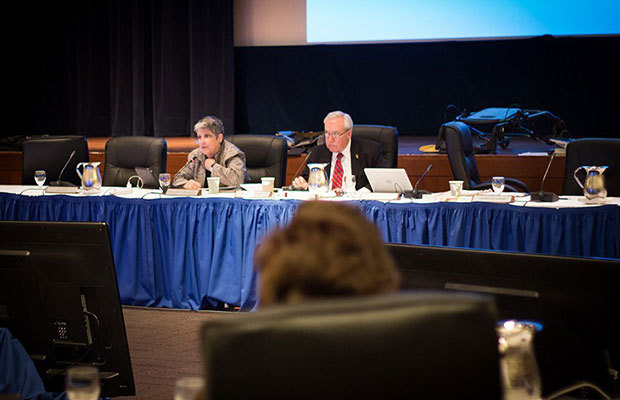Napolitano apologizes for comments, UC regents vote for veteran exemptions from nonresident tuition

By Sahil Chinoy
After an apology from UC President Janet Napolitano for comments about a student protest at Wednesday’s meeting, the UC Board of Regents voted to exempt some veterans from nonresident tuition in the final day of a three-day meeting at UCSF.
Napolitano, who inflamed the public Wednesday when she said she didn’t “have to listen to this crap” in reference to a student demonstration, opened the meeting by apologizing for the use of a word she doesn’t “normally use.” After a public comment period, the board voted to exempt veterans who enroll within three years of active service from nonresident supplemental tuition, in accordance with federal policy.
Acknowledging that she was “caught on a mic with a word that was unfortunate,” Napolitano apologized and asked for “empathy and understanding” but said public comments should be “expressed seriously.” Her comments Wednesday followed demonstrations in which students stripped to their undergarments and threw fake money at the regents.
The incident comes during a period of heightened tension between the university and its students, with a tuition increase remaining a possibility considered by Napolitano and Gov. Jerry Brown’s “committee of two.” The committee, charged with examining the cost structure of the university, did not make any specific recommendations at Wednesday’s meeting.
“The governor and I are working very hard to set a budget path for the university,” Napolitano said at the meeting. “It’s serious work, to be taken seriously.”
After Napolitano’s apology, the board heard public comments on divestment from fossil fuels, student mental health and the relationship between recent incidents of alleged anti-Semitism at UC campuses and divestment from Israel.
A committee of the board voted to recommend an amendment to the university’s education policy that would exempt recent veterans from nonresident tuition, regardless of the individual’s formal state of residence. Nonresidents pay about $24,000 in supplemental tuition annually, and the university currently enrolls more than 1,600 student-veterans.
The policy addresses the fact that because those on active military duty often move, they sometimes find it difficult to satisfy residency requirements immediately upon discharge.
The amendment would align the university’s policies with recent federal legislation. The financial impact is likely to be “modest,” according to the action item, and would pale in comparison to the loss of GI Bill funding — estimated to be at least $30 million for the more than 1,400 students who receive benefits from the bill — that the university would experience if it did not comply with the federal policy. Fewer than 300 GI Bill recipients are nonresidents, according to the university.
The board also heard an update on the status of the university’s veteran services. The ensuing discussion focused largely on publicizing the university to recent veterans and individuals currently on active military duty.
“Private (for-profit) institutions are outmarketing us, outpacing us and certainly not performing well for this group of students,” said Regent Eloy Ortiz Oakley at the meeting.
A summit will be held in May with the California State University system, the California Community Colleges system and the California Department of Veterans Affairs to highlight the benefits of public higher education for veterans.
In addition, the board discussed the status of a $36.6 million fine levied against the Department of Energy and Los Alamos National Security LLC, or LANS, by the New Mexico Environment Department after a canister of waste related to Los Alamos National Laboratory released detectable radiation in February 2014.
LANS, which was formed in part by the university, has operated the Los Alamos lab since 2006. The existence, however, of LANS — a limited liability company — is “designed to protect (the university) against these kinds of things,” according to Regent Norman Pattiz.
The board will next meet May 21-22 at UCSF.
[Source]: Daily Californian


